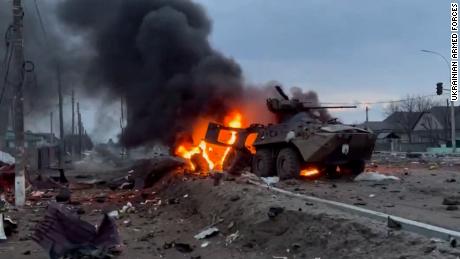I identify the following causes:
1) Bad (echo-chamber) intelligence
2) Unsuitable unit and formation organisation for general mobile warfare, as the basic, conventional elements had been focused exclusively on limited military support of other means of waging open conflict
3) Low quality tactical leadership (no initiative, no hard-exercised combined arms tactical skills, road-bound advance, no integration of drones for reconnaissance and supplementary deep fire support)
4) Inferior training and motivation of soldiers also mirroring the character/lack of dynamic leaderby example
5) Inferior quality materiel (especially personnel carriers, drones, and trucks for the logistics tail, but also protection of tanks)
The problems are apparently much smaller in the Russian Naval Infantry and airborne troops than in the regular army units, so the analysis concentrate on the latter.
Reference 1) The echo-chamber intelligence
As we know from other cases, this problem is hardly unique to Putin’s Russia now. We just have to go back to the situation in Afghanistan last summer or Donald Rumsfeld’s record before the invasion of Iraq in 2003.
As long as Russia have a dictatorial leadership real improvement is unlikely.
Reference 2) The Battalion Task Group building block
The BTG proved far too weak to take the attrition and still operate as the traditional Russian/Soviet break-through and follow-up manoeuvre require. Its effect is also dependents on a quality of delegated command that seems to be beyond the Russian Army to achieve (except at the end of a major war as in 1946-45).
The Russian Army could probably improve its performance by returning til Motor Rifle and Tank Regiment based divisions. However, this would be a move away from the 2013 Military Doctrine focus on grey zone situations, and Russia will find it hard to create the mass required to succeed.
Reference 3) Leadership quality improvement
In order to achieve this the army needs to allow and breed initiative amongst its officers. Their education, training and character of the field exercises should change in a fundamental way away from detailed planned, “scientific” battle management military paradigm. It would require a very significant change of service culture that would probably be easier to develop and accept in the major to colonel ranks than among the junior officers. Apparently such improvement has been easier to develop in the elite naval and airborne infantry as well as spesnaz units than in the regular army.
Reference 4) Soldiers’ training and motivation
It would apparently take a major change of service culture and leadership commitment to change the “dedovshchina” treatment of conscript soldiers and make regular contract service attractive to both the soldier and his family. The war has made clear that this has not yet been anywhere near achieved in the army.
Reference 5) The weapons, etc.
I see this as the most difficult Russian challenge, as it would require not only a massive use of resources, it would have to discipline and clean-up the corruption in a lucrative part of the state sector . As a minimum they have to achieve a standardised modernisation of all main battle tanks with new defensive sensors and automatic active armour to defeat modern anti-tank weapons … in real competition between tha design bureaus. They also had to develop and integrate far better drone systems, to supply thousands of new armoured transport and combat vehicles for their infantry (motor riflemen) and to replace tens of thousands of trucks with vehicles with a far better cross-country capability. Parallel with this the air forces need to produce a large number of new sophisticated replacement aircraft and large stocks of precision munitions.

Giv dem nu ikke gode ideer!
Jeg skrev et debatindlæg i Jyllands-Posten i sidste uge: https://jyllands-posten.dk/debat/breve/ECE13786476/kaere-nato-hjaelp-ukraine-slip-dronerne-loes/
Det er spændende hvad vi oplever af militærteknologisk udvikling i Ukraine i disse uger. Er dinosaurernes (=kampvognenes) tid mon ved at være forbi? – De er ihvertfald langt mere sÃ¥rbare end tidligere.
Mvh
Søren Dalsgaard, historiker og tolk i EP
PS, Jeg ser ikke din mailadresse her på siden. Nu får du min.
Jeg har en sund respekt for russiske generalstabsofficerer. De ved alt dette og mere til. Deres problem er, at disse effektiviteringstiltag er uigennemførlige uden at smadre eller forgifte deres politisk-økonomiske system. Så de må meget gerne følge vejledningen.
Søren Dalsgård: Hvis kampvognenes tid er forbi (hvad jeg har set argumenter imod), hvad skal så erstatte dem?
En kampvogn har i mange år ikke været anvendeligt som et selvstændigt våbensystem. Kun idioter og amatører har troet andet. Det er blot en meget beskyttet, mobil, meget kraftig og meget præcis kanon, der indgår i et team med andre våben. Dette team er en forudsætning for muligheden for modoffensiv optræden. Det eneste, der nu er sket, er, at teamet også skal beskyttes bedre opaf. Kun Israel hen indtil nu arbejdet effektivt på at løse problemet. Den nye russiske kampvogn, T-14 Armata, løser problemet ved automatisk at nedskyde det ankommende missil eller angrebsdronen lige før den rammer vognet.